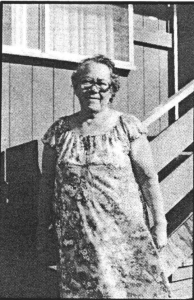Martina Fuentevilla

A Social History of Kona
This project, a case study of Hawaii's social history, focuses on Kona where people nurtured the development of a community and participated in and witnessed some.of the major historical developments of the islands.
Martina Kekuewa Fuentevilla, a lifelong resident of Kona, Hawaii, was born on September 30, 1908, in Honaunau, South Kona, Hawaii. Raised by her kahu hanai, a system of guardianship commonly practiced in Hawaii, she lived separately from her mother, who resided with Martina's grandparent. Throughout her life, Martina held various jobs, including a coffee picker, tobacco stringer, hat weaver, and entertainer. She began her career as an entertainer at a young age, playing music with her aunt, Mrs. Kelekolio. In 1927, she married Leon Labadios Fuentevilla, with whom she had six children. Martina was an active member of the Catholic Church and remained a resident of Honaunau.
Scope and Content Note:
The oral history interviews with Martina Kekuewa Fuentevilla, conducted by Larry L. Kimura in December 1980 and January 1981, provide a rich account of Martina's life and the cultural and social changes she witnessed in Hawaii. The interviews, conducted in Hawaiian and translated by Kimura, cover a range of topics, including Martina's upbringing, her various occupations, and her experiences as an entertainer. Martina discusses the changes in political campaigning, contrasting the lively speeches and songs of the past with the more straightforward voting process of her present. She also shares her experiences working in the tobacco industry, including her husband's work in the fields after immigrating from the Philippines. As an entertainer, Martina recounts her travels across Hawaii, campaigning for various political candidates through music and dance. She also shares personal anecdotes, such as her husband's dietary preferences and the use of fruit as a source of light. The interviews provide valuable insights into the social and cultural history of Hawaii, as well as the personal experiences of a lifelong resident.
Interview conducted in Hawaiian (translation).
Program Note:
This interview is part of the Center for Oral History's project A Social History of Kona. Interviews from this project are available in the Center's ScholarSpace open access repository.
The Center for Oral History (COH), in the Department of Ethnic Studies at the University of Hawaiʻi at Mānoa, collects, documents, preserves and highlights the recollections of Native Hawaiians and the multi-ethnic people of Hawaiʻi. It produces oral histories and interpretive historical materials about lifeways, key historic events, social movements and Hawaiʻi’s role in the globalizing world, for the widest possible use.
Please Note: The oral histories in this collection are protected by copyright and have been created for educational, research and personal use as described by the Fair Use Doctrine in the U.S. Copyright law. Please reach out Voices@noaa.gov to let us know how these interviews are being used in your research, project, exhibit, etc. The Voices staff can help provide other useful resources related to your inquiry.
The NOAA mission is to understand and predict changes in climate, weather, oceans, and coasts, to share that knowledge and information with others, and to conserve and manage coastal and marine ecosystems and resources. The Voices Oral History Archives offers public access to a wide range of accounts, including historical materials that are products of their particular times, and may contain offensive language or negative stereotypes.
Voices Oral History Archives does not verify the accuracy of materials submitted to us. The opinions expressed in the interviews are those of the interviewee only. The interviews here have been made available to the public only after the interviewer has confirmed that they have obtained consent.
